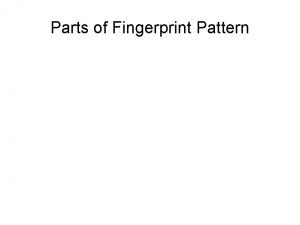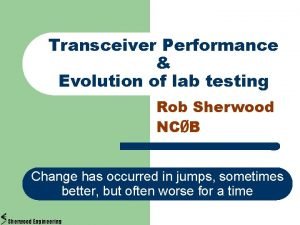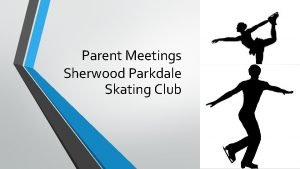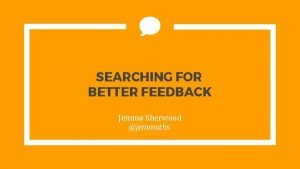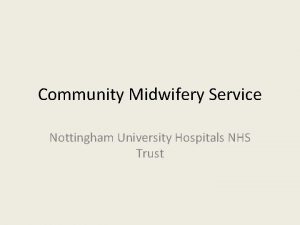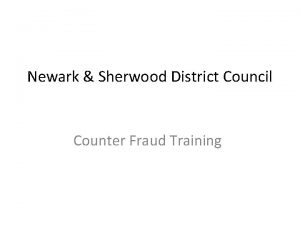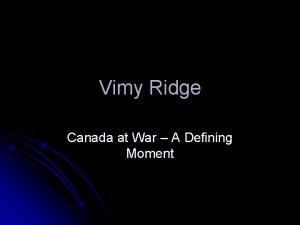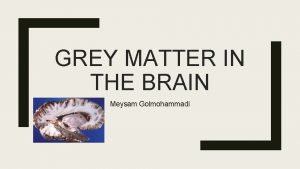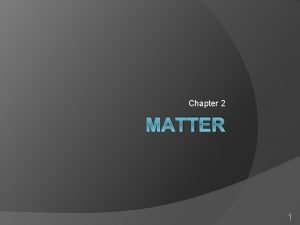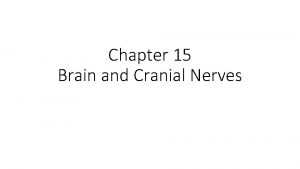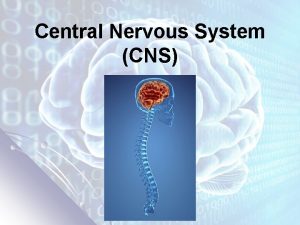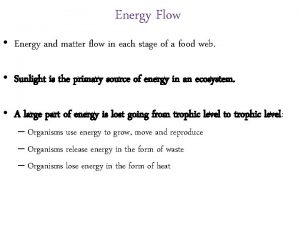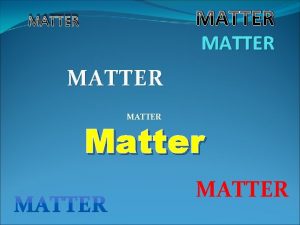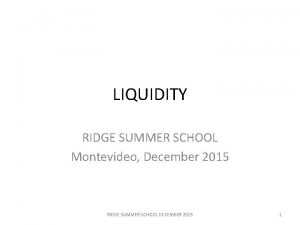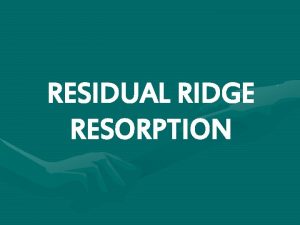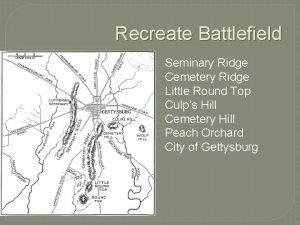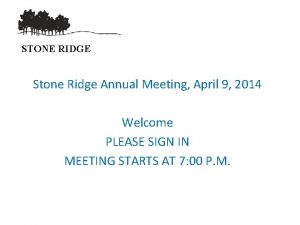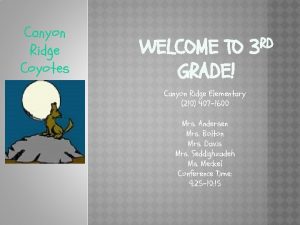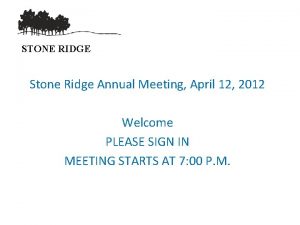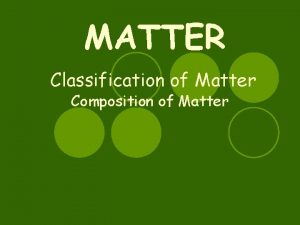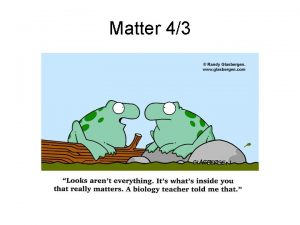Kids Matter Sherwood Ridge PS Why Kids Matter


























- Slides: 26

Kids. Matter Sherwood Ridge PS

Why Kids. Matter? It has been estimated that 1 in 7 school-age children has a mental health problem - like anxiety, depression or challenging behaviour - but only 1 in 4 gets the help they need. Similar rates have been found in early childhood too. It can be tricky recognising whether children need help. Sometimes families, teachers and staff might not know what help is available or how to get it. In some cases, it may be difficult to access mental health services in their area. The good news is that Kids. Matter was developed to promote positive mental health and wellbeing in children, and to help prevent and identify mental health problems early in life. Kids. Matter has already made a big difference to the lives of Australian children because it unites all the people that influence their mental health most – families and education and childcare staff. Reference Sawyer, M. G. , Arney, F. M. , Baghurst, P. A. , Clark, J. J. , Graetz, B. W. , Kosky, R. J. , et al. (2001). The mental health of young people in Australia: Key findings from the child and adolescent component of the national survey of mental health and well-being. Australian and New Zealand Journal of Psychiatry, 35, 806 -814.

About Kids. Matter is an Australian mental health and well-being initiative set in primary schools and early childhood education and care services (like preschools, kindergartens and day care centres). It’s a framework that helps these places take care of children's mental health needs by: • • creating positive school and early childhood communities teaching children skills for good social and emotional development working together with families recognising and getting help for children with mental health problems.

What does mental health mean for children? • Good mental health is “a state of well-being in which the individual realises his or her own abilities, can cope with the normal stresses of life, can work productively and fruitfully and is able to make a contribution to his or her community. ” (World Health Organization, 2007) Or, put more simply. . . “Mental health is the way we think or feel about ourselves and what is going on around us, and how we cope with the ups and downs of life. ” • Good mental health for children means “the capacity to enjoy and benefit from satisfying family life, relationships, and educational opportunities, and to contribute to society in a number of age appropriate ways. It also includes freedom from problems with emotions, behaviours or social relationships that are sufficiently marked or prolonged to lead to suffering or risk to optimal development in the child, or to distress or disturbance in the family. ” (Raphael, 2000) • Mental health and wellbeing is vital for learning and life. Children who are mentally healthy learn better, benefit from life experiences, and have stronger relationships with family members, school staff and peers.

What does it mean to be a Kids. Matter Primary school? We know that mental health and wellbeing is very important for children’s learning and development. Children who are mentally healthy learn better, benefit from life experiences and have stronger relationships with their families, friends and school staff. Kids. Matter Primary helps schools to support children’s mental health and wellbeing by bringing together the important people in a child’s life: their family, their school and the wider school community.

What does Kids. Matter Primary look like at school? • The way that Kids. Matter Primary works varies from school to school. Kids. Matter Primary is not a program that schools work through from beginning to end. It’s more about developing a contextual framework to support building a positive school community and culture where support for children’s mental health is promoted and the whole school community is involved in planning and strategies to support children’s mental health and wellbeing.

The Components • Schools work through four components on their Kids. Matter journey. • Each component focuses on a different area that research has shown to be important for children’s mental health and wellbeing. Component 1: Positive school community Component 2: Social and emotional learning for students Component 3: Working with parents and carers Component 4: Helping children with mental health difficulties

Component 1: Positive School Community

Component 2: Social and Emotional Learning

Component 3: Working with parents and carers

Component 4: Helping Children with mental health

Why is Social & Emotional Learning important? Children’s social and emotional skills are developing all the time. Skills may develop differently for different children. Children benefit from having many learning and practise opportunities. There are many facets to social and emotional learning, which are summarised in the following


Social and emotional development in the early years Birth to school age is the period of greatest growth and development. The early childhood years are not only a time for taking first steps or for saying first words. They are also when, through their relationships with others, children are building expectations about their world and the people in it and are developing their first: • sense of self including feeling good about themselves and what they can do • social skills to get along in life with others • emotional skills such as recognising, expressing and managing a wide range of feelings. These first skills are very important as they form the foundations for children’s ongoing development and affect their mental health and wellbeing, now and into the future.

Why social and emotional learning (SEL) is part of Kids. Matter Primary Social and emotional learning is about learning how to manage feelings, manage friendships and solve problems. These are essential life skills that support wellbeing and positive mental health. Social and emotional skills promote children’s ability to cope with difficulties and help to prevent mental health problems. Children who have developed social and emotional skills find it easier to manage themselves, relate to others, resolve conflict, and feel positive about themselves and the world around them. Kids. Matter emphasises teaching social and emotional learning as a way of promoting children’s mental health. Social and emotional learning provides practical skills that all children can learn and apply to everyday situations. Learning skills such as self-awareness, effective communication and conflict resolution can also help to prevent the development of mental health difficulties in children who might otherwise be vulnerable. In this way teaching children social and emotional skills helps to promote resilience – the capacity to cope

What does social and emotional learning have to do with learning? Research has shown that children’s learning is influenced by a range of social and emotional factors. How well children do at school is affected by things such as: • how confident children feel about their abilities • how effectively they are able to manage their own behaviour • how well they can concentrate and organise themselves • how effectively they can solve problems • how positively they are able to get on with teaching staff and with peers • how effectively they take into account others’ needs • how well they can understand accept responsibilities.


How social and emotional learning is taught Social and emotional learning programs that have been shown through research to improve children’s social and emotional competence are more likely to achieve goals related to improving students’ mental health. Kids. Matter Primary provides schools with detailed information about programs and the research evidence for their effectiveness. School-wide classroom teaching of social and emotional learning allows staff and students to share a common understanding of what it is all about. Importantly, the emphasis of its teaching needs to be not just on learning about emotions and relationships, but on practical skills that children can apply across a range of situations at school, at home and in the broader community. Children learn social and emotional skills most effectively when they are also reinforced at home. Many social and emotional learning programs include components for involving the family and community in promoting the teaching. This gives parents and carers the chance to learn about the particular approach schools take and what they can do to support children’s social and emotional learning. In this way, school-based social and emotional learning offers gains all

The social and emotional learning framework Many teaching staff and schools already incorporate some aspects of social and emotional learning. The Kids. Matter Primary approach looks at what schools are already doing and asks them to evaluate how systematically and effectively they are teaching social and emotional skills. It provides them with a framework for planning, teaching and evaluating to help ensure that from year to year children can build social and emotional skills that are relevant and appropriate for their age and skill level. The Kids. Matter approach to social and emotional learning is based on the model developed by the Collaborative for Academic, Social and Emotional Learning (CASEL), an internationally-recognised lead organisation for this area of research. The diagram outlines the five core competencies that CASEL has identified as central to social and emotional learning. 1


How does Kids. Matter Primary help the whole school community? • It’s not just children who benefit from Kids. Matter Primary. The whole school community benefits when schools make mental health and wellbeing a priority. • Kids. Matter Primary helps families too. Kids. Matter Primary schools’ build positive relationships with families so that they can work together to support children. • A Kids. Matter Primary school is also a place where families can connect with each other and seek support for their children’s mental health and wellbeing.

The Kids. Matter journey in a school • One of the first things that a school does when it starts Kids. Matter Primary is to put together an Action Team that is responsible for coordinating Kids. Matter Primary at the school. The Action Team consists of a diverse group of members of the school community, including families, who are encouraged to contribute to Kids. Matter Primary at their school. • The Action Team will guide the school through a review of each of the four components. This involves surveying school staff and families to find out what’s most important to them when it comes to supporting children’s mental health and wellbeing. This information is then used to develop the school’s Kids. Matter Primary Action Plan, which includes strategies for sustained improvement over time.

What are we already doing? The SRPS staff are currently completing the Kids. Matter staff training components in order to plan, implement and create whole school change in the area of mental wellbeing • • PAL – Positive Action for Learning and Teaching programs Visible Learning Kids. Matter: Component 1 Positive school community • Kids. Matter: Component 2 Social and emotional learning for students • Kids. Matter: Component 3 Working with parents and carers • Presentation Day • • • Quality Teaching School Assemblies Merit awards Sherwood Stars Caught you being good School leaders Parent Helpers Seasons For Growth – grief and loss Anxiety sessions with our school counsellor

• Everyone enters the world with potential. Our experiences develop our abilities and shape our expectations, which in turn colour perceptions of the world in which we live. • When individuals are empowered to have control over lived experiences, they build their own resilience and in turn contribute positively to collective wellbeing and an inclusive community. • NSW Public Schools, in committing to and enabling individual and collective wellbeing of children and young people, importantly provide for the growth and holistic development of students and their success in school and beyond. • Children and young people in public education in NSW will experience a sense of connection, inclusion, respect for individuality and difference, resilience, empowerment, capacity to contribute to their school and wider community, and confidence to positively shape their own futures. • Developing and fostering wellbeing is the ultimate deliverable that comes with the privilege of working with children and young people in NSW public schools.

Activity – picture this • Can you choose a photo that says something about you as a person? • Which photos remind you of your strengths and the strengths of others? • Is there a photo that resonates with you? Can you say why? • Is there a photo that you would like your loved ones to associate with their memories of you?

Where to next? • Staff to complete Kids. Matter component training • Students and staff to participate in ongoing, embedded SEL lessons to support mental wellbeing • Staff to implement, reflect on and evaluate SEL framework to make contextually relevant for SRPS community • Parents/carers are encouraged to read information located in newsletter for home discussions, in alignment with our PAL expectations
 Hey bye bye
Hey bye bye What are the two focal points of a loop?
What are the two focal points of a loop? Kids r kids west cobb
Kids r kids west cobb Rob sherwood ham radio
Rob sherwood ham radio Sherwood parkdale
Sherwood parkdale Marking
Marking Rivers passing through sherwood forest
Rivers passing through sherwood forest Sherwood transceiver ratings
Sherwood transceiver ratings Cq bw contest
Cq bw contest Bestwood and sherwood midwifery
Bestwood and sherwood midwifery The egg sherwood anderson summary
The egg sherwood anderson summary Switch light os
Switch light os Sherwood parkdale skating club
Sherwood parkdale skating club Newark and sherwood homes bidding
Newark and sherwood homes bidding Dhl sherwood park
Dhl sherwood park Don't ask why why why
Don't ask why why why Why was vimy ridge, a defining moment for canada
Why was vimy ridge, a defining moment for canada Classification of matter section 1 composition of matter
Classification of matter section 1 composition of matter Koosha golmohammadi
Koosha golmohammadi Composition of matter section 1
Composition of matter section 1 Chapter 2 section 1 classifying matter answers
Chapter 2 section 1 classifying matter answers Gray matter and white matter
Gray matter and white matter Section 1 composition of matter
Section 1 composition of matter Gray matter and white matter
Gray matter and white matter What is grey and white matter
What is grey and white matter Flow energy review
Flow energy review Why business models matter
Why business models matter

